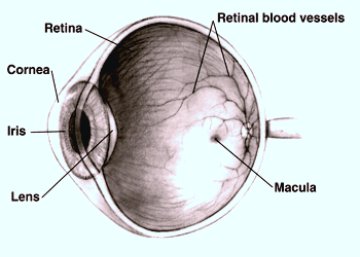|
Macular Degeneration Is One Of The Main Causes Of Blindness
Age related macular degeneration is an eye disorder that affects the macula, the part of the retina responsible for central vision. It is a chronic eye disease that affects more than 10 million Americans. It Is One Of The Leading Causes Of Blindness In People Over 60 In The United States. It is caused when part of the retina deteriorates.
It can result in:
Share Your Macular Degeneration Stories Genes tied to this disease, confirm the fact that chronic inflammation helps destroy the central area of the retina in this eye disorder. Although inflammatory reactions commonly occur as part of the bodies response to bacterial or viral infection, inflammation can also occur without a visible infection. Allergens such as:
May Provoke Chronic Inflammation Eye Surgery Is Another, And Perhaps The Most Common, Cause Of Eye Inflammation. Physicians expect their patients to suffer eye inflammation as a direct result of eye surgery and, as such, treat their patients in advance for this. There are two types of age related macular degeneration: Dry (atrophic) form: This type results from the gradual breakdown of cells in the macula, resulting in a gradual blurring of central vision. Single or multiple, small, round, yellow-white spots called drusen are the key identifiers for the dry type. These spots are located in the back of the eye at the level of the outer retina. Drusen are detected by examination of the retina with:
Most people begin with the dry form and develop the yellow-white spots called drusen. Wet (exudative or neovascular) form: In the wet form, newly created abnormal blood vessels grow under the center of the retina. This form affects only about 15% of people who have the disease, but accounts for two-thirds of the people as all causes of blindness. People with the following conditions or characteristics are most at risk for developing macular degeneration:
It's been said the eyes are the windows to the soul. But what if the eyes are the windows to your whole body? INDIANAPOLIS (Ivanhoe Newswire) -- From diabetes to cancer -- it can all be spotted by taking a closer look at your eyes. A new laser scan is helping doctors find major health problems sooner. Gregg Ossip, O.D., an optometrist at Ossip Optometry in Indianapolis, Ind., spots the problem with a one-second laser scan. "It's actually looking through the dark part of the eye, looking through the pupil to the back of the eye which is the retina, so it's just capturing that image," Dr. Ossip said. That image can spot: The scan zooms in on tiny blood vessels. If there are hemorrhages in the back of the eye:
Might be in your future. To Prevent Eye Disorders Good nutrition is needed for the entire body, including the eyes. Follow an anti inflammation diet . May 14, 2007 - Individuals who have higher dietary intake of foods with Omega 3 Fatty Acids and higher fish consumption have a reduced risk of advanced age related macular degeneration. Another reason to take a quality Omega 3 Fish Oil Supplement . People with higher serum levels of vitamin D may have a reduced risk of the early stages of the disease, according to two reports in the May issue of Archives of Ophthalmology, one of the JAMA/Archives journals. Checking someone's CRP level may gauge their odds of developing the disease the researchers suggest. Ask your doctor for the C-Reactive Protein (CRP) test. It's a simple blood test done in the doctors office. The National Eye Institute Scientists Are Currently:
This research should provide better ways to detect, treat, and prevent all causes of blindness. Improve Macular Degeneration, Dry Eye and Floaters with nutritional supplements for eye health. Eye Disorders
Share Your Experience With Macular DegenerationFind people that share the same challenges
|






